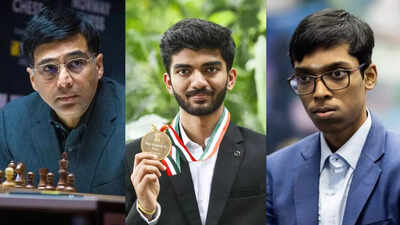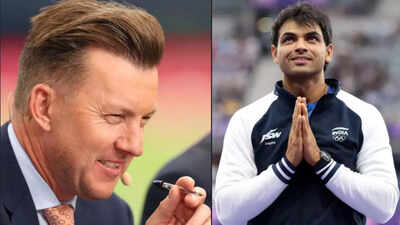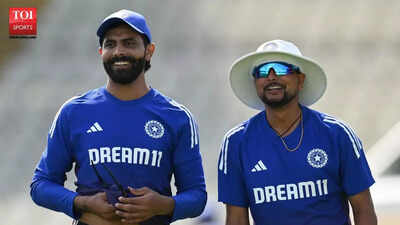NEW DELHI: In the hit HBO series Game of Thrones, those from the North and the South had a contrasting approach towards dominance, survival, and eventually success. The blood and instinct of the North were met with the alliance-building of the South.Along those lines, a similar story is playing out in Indian chess.23-year-old Vantika Agrawal, a double gold medallist from the 2024 Chess Olympiad and an Arjuna Awardee, says she feels let down by the way chess is perceived in the northern part of the country.Go Beyond The Boundary with our YouTube channel. SUBSCRIBE NOW!“In North India, there is no culture of chess,” the Uttar Pradesh-born Grandmaster tells TimesofIndia.com.“If someone asks what you do here, and you say, ‘I’m a chess player,’ their response is usually, ‘Okay, but what do you actually do? What are you studying?’ I think it’s still the same story, even after winning so many medals. People still ask, ‘Chess is fine, but what do you really do?'”Her words land like a checkmate: honest, sharp, and damning. And she is not alone.If a line is drawn in the middle, the southern part of India would undoubtedly be the undisputed Dragonstone of Indian chess. From Viswanathan Anand to D Gukesh, from Praggnanandhaa to his sister Vaishali, the state has produced multiple stars.Whereas, in North India, in states like Delhi, Haryana, Punjab, and Uttar Pradesh, the board looks starkly different.Delhi Chess Association (DCA) president Bharat Singh Chauhan doesn’t sugarcoat it: “By birth, North Indians are different and South Indians are different. There’s a massive cultural difference between North and South India. If I put it bluntly, in the South, even a billionaire can be seen wearing slippers and standing at a bus stop, while here in the North, even someone with Rs 5 crore gets treated like royalty.”
In the North, chess often battles for legitimacy — seen by many as a hobby rather than a career.“Speaking of Delhi specifically, Parimarjan Negi, a GM from Delhi who is now settled in the US, and GM Sahaj Grover, too, have almost quit chess. They feel like whatever they wanted to achieve from this sport, they have achieved it. It’s a cultural and mindset difference. In the South, there is a deep-rooted chess culture. Even if you talk to Viswanathan Anand today, you’ll see the difference,” added the DCA president.The numbers back him up. Delhi NCR alone sees Rs 5 crore in monthly earnings across 200-odd chess coaches. Yet, the quality is not up to the mark, with families switching coaches for marginal cost differences.“Today, there’s no chess player dying of hunger. Here, the thing is, nobody retires. There’s also no control over trainers. Many come promising, ‘I’ll make your child the next Anand,’ but they’re lying. It’s just marketing. For a profit of Rs 5,000, people switch coaches. That’s what we lack here,” Chauhan elaborated. “In the South, there’s loyalty — like Vishnu Prasanna has been with Gukesh for years. The same goes for RB Ramesh and Praggnanandhaa, Vaishali, Aravindh Chithambaram. That culture doesn’t exist here. We are trained thugs.”ALSO READ: ‘Earlier, I used to beat Indians at will’: What global chess stars in their 30s, 50s, and 80s say about India’s dominanceGrandmaster SL Narayanan, who hails from Kerala — a state often grouped into the broad ‘South’ label — goes a step further to make a sharp distinction. “People label everything as ‘South,’ but honestly, only Tamil Nadu has that level of chess support,” the 27-year-old said. “In my state, if you become a Grandmaster, it’s still not a big deal. But Tamil Nadu? The government awards you. That motivation is powerful.”He isn’t exaggerating. International Arbiter and senior chess administrator Gopakumar Sudhakaran, who also hails from Kerala, says Tamil Nadu’s emergence as the mecca of Indian chess is no accident — it’s the result of cultural evolution. And surprisingly, the COVID-19 pandemic, despite its devastation, played a significant role in accelerating this shift.“In Tamil Nadu, chess is part of household culture. Even if it’s not competitive, the father, mother, everyone knows how to play. That’s not as common in the North. But it’s just how societies evolve differently,” Sudhakaran added.“Post-COVID, online platforms have really helped bridge the gap. Earlier, we couldn’t imagine International Masters coming from places like Jammu & Kashmir; now, it’s happening. Coaching is more accessible, and we’ve entered a kind of cosmopolitan training environment.“Chess was once seen as gambling in some parts of North India, but now parents see its value and support their children.”Shyam Sundar M, a 2013 Grandmaster who now coaches young talents like FIDE World Junior Champion Pranav V and GM Srihari LR at Chennai’s Chess Thulir academy, reveals how and why so many Tamil Nadu players dedicate themselves entirely to chess, often at the cost of academics.
Poll
Do you believe that chess is perceived differently in Northern and Southern India?
“In Tamil Nadu, many players dedicate themselves fully to chess, often sacrificing academics. And I have seen a large trend since the COVID-19 days. Some schools here, like Velammal, are supportive, offering flexibility in terms of attendance and even financial help. When Gukesh won (the World Championship), he was gifted a car worth nearly Rs 1 crore. The state government also gives cash awards,” the 33-year-old Shyam Sundar explained.“In Tamil Nadu, more players keep coming up. So naturally, some parents start thinking maybe even my child can become like that. They get inspired by other kids’ success. And when more players come, overall interest in the game also increases. That’s how the game becomes more fair and competitive.”The North isn’t barren. But it lacks the sacred institutions that the South has carefully cultivated. Like Jon Snow staring down Daenerys’s dragons, the northern talent still burns bright, just without the firepower behind it.The challenge now is to forge a unified kingdom, one where Vantika doesn’t have to explain her profession, where switching coaches isn’t routine, and where a child from Rohtak can dream as vividly as one from Rameswaram.








